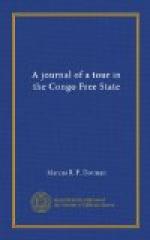Hot, sticky, tired and cross we prepare for our first meal on a Congo steamer. It consisted of a soup of mystery, chicken, which had been washed in the river close to a group of natives bathing and a goat, killed an hour before dinner, whose flesh was thrown quivering into the pot. However, there was some bread and tinned peaches and it was no use being fastidious in Central Africa. This was washed down with the regulation half litre of red wine, a kind of claret which is quite drinkable and some native coffee which had a delicate and fine aroma, but was badly made.
The captain—as indeed are nearly all the officers of the river steamers—was a Scandinavian and spoke English very well. He explained that the ship was not very clean or inviting-looking, which was the truth, but as the lower deck was lumbered up with the horses of Commandant Sillye and was swarming with natives, it was only to be expected.
Then to bed, but not to sleep, for the boys to save themselves trouble, had not fixed the mosquito net properly. In my innocence I merely ordered them to do it and had not stood by and watched. It is indeed necessary always to see that the native does as he is told, for the moment one’s back is turned, he is eating if there is anything rotten enough at hand to tempt him and if not, he quietly goes to sleep. Even these State servants who speak the native language and also a kind of French, really live the lives of animals, for they eat, drink, and sleep if left alone and only work when they are shown how, and watched all the time.




